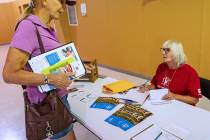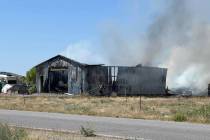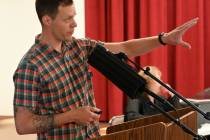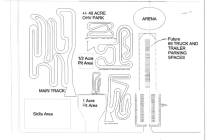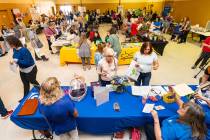A case for upward mobility
All men are by nature equal, but differ greatly in the sequel.
WASHINGTON — A quarter of a millennium later, that couplet from a colonial American almanac defines an urgent challenge. Modern society increases how, and the predictability of how much, people differ in the sequel.
If America is to be equitable, with careers open to all talents and competent citizens capable of making their way in an increasingly demanding world, Americans must heed the warnings implicit in observations from two heroes of modern conservatism. In “The Constitution of Liberty” (1960), Friedrich Hayek noted that families are the primary transmitters of human capital — habits, mores, education. Hence families, much more than other social institutions or programs, are determinative of academic and vocational success. In “The Unheavenly City” (1970), Edward C. Banfield wrote: “All education favors the middle-and upper-class child, because to be middle or upper class is to have qualities that make one particularly educable.”
Elaborating on this theme, Jerry Z. Muller, a Catholic University historian, argues in the March/April 2013 issue of Foreign Affairs that expanding equality of opportunity increases inequality because some people are simply better able than others to exploit opportunities. And “assortative mating” — likes marrying likes — concentrates class advantages, further expanding inequality. As Muller says, “formal schooling itself plays a relatively minor role in creating or perpetuating achievement gaps” that originate “in the different levels of human capital children possess when they enter school.”
The Cato Institute’s Brink Lindsey argues in “Human Capitalism: How Economic Growth Has Made Us Smarter — and More Unequal” that economic growth intensifies society’s complexity, which “has opened a great divide between those who have mastered its requirements and those who haven’t.” Modernity — education-based complexity — intensifies the demands on mental abilities. People invest increasingly in human capital — especially education — because status and achievement increasingly depend on possession of the right knowledge.
Lindsey cites research showing that “by the time they reach age 3, children of professional parents have heard some 45 million words addressed to them — as opposed to only 26 million words for working-class kids, and a mere 13 million words in the case of kids on welfare.” So, class distinctions in vocabularies are already large among toddlers. Parental choices of neighborhoods and schools mean that children of college-educated parents hang out together. Such peer associations may have as much effect on a child’s development as do parents. These factors, Lindsey says, explain why “people raised in the upper middle class are far more likely to stay there than move down, while people raised in the working class are far more likely to stay there than move up.”
In a historical blink, Lindsey says, humanity has moved from lives rooted in a remembered past to lives focused on an imagined future. This future orientation favors the intellectually nimble. “Who gets ahead, who struggles to keep up, and who gets left behind are now determined primarily by how people cope with the mental challenges of complexity.” And coping skills are incubated in families.
Today, the dominant distinction defining socioeconomic class is between those with and without college degrees. Graduates earn 70 percent more than those with only high school diplomas. In 1980, the difference was just 30 percent.
Soon the crucial distinction will be between those with meaningful and those with worthless college degrees. Many colleges are becoming less demanding as they become more expensive: They rake in money — much of it from government-subsidized tuition grants — by taking in many marginally qualified students who are motivated only to acquire a credential, and who learn little.
Lindsey reports that in 1961, full-time college students reported studying 25 hours a week on average; by 2003, average studying time had fallen to 13 hours. Half of today’s students take no courses requiring more than 20 pages of writing in a semester. Given the role of practice in developing expertise, “the conclusion that college students are learning less than they used to seems unavoidable.” Small wonder those with college degrees occupying jobs that do not require a high school diploma include 1.4 million retail salespeople and cashiers, half a million waiters, bartenders and janitors, and many more.
“Most American kids,” Lindsey concludes, “are now raised in an environment that is arguably less favorable for developing human capital than that in which their parents were raised.” America’s limited-government project is at risk because the nation’s foundational faith in individualism cannot survive unless upward mobility is a fact.
George Will’s email address is georgewill@washpost.com
(c) 2013, Washington Post Writers Group







